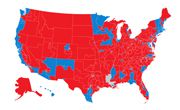What Workers Can Expect After the 2014 Election
Posted on November 7, 2014 What’s ahead for employment law after the Republican Party’s sweep in this week’s congressional elections?
What’s ahead for employment law after the Republican Party’s sweep in this week’s congressional elections?
While some employee-friendly initiatives are non-starters for the new 114th Congress, measures with strong bipartisan support — whistleblower protection, in particular — should move ahead quickly as Republicans try to show they can get things done, according to the attorneys of The Employment Law Group® law firm.
In addition, President Obama may issue some targeted executive orders and administrative changes — and his appointees in the U.S. Department of Labor and elsewhere will create more legal precedents favorable to employees, with continued backing from federal courts.
“The last two years of President Obama’s tenure will be a time of consolidation and incremental gains for employees,” said R. Scott Oswald, managing principal of The Employment Law Group (TELG). “We expect that the new Republican majority in the Senate will lead the way on new whistleblower protections, while the President will continue to push for broader interpretation of laws against discrimination and retaliation.”
Among the areas TELG attorneys will be watching:
- Protection for tax whistleblowers. Sen. Orrin Hatch (R-Utah) will likely head the Senate Finance Committee, and Sen. Chuck Grassley (R-Iowa) will remain a force. Together with Sen. Ron Wyden (D-Ore.), the outgoing committee chairman, they already have pushed the Internal Revenue Service to offer better treatment to whistleblowers who identify tax fraud. The IRS whistleblower program currently offers awards for such tipsters — but no protection for employees who may be fired for reporting fraud at their companies. The 114th Congress can fix this.
- Broader protection for federal whistleblowers. Sen. Grassley also recently bemoaned the treatment of whistleblowers within the Federal Bureau of Investigation, an area that’s overdue for either congressional or executive action. He has previously mustered bipartisan support to close other gaps in protection for federal employees, as with last year’s revisions to the Military Whistleblower Protection Act. Federal employees will also see some judicial action: TELG expects that the U.S. Supreme Court will force the Obama Administration to back off its contention that it can use regulations to limit the Whistleblowers Protection Act of 1989.
- Expansion of benefits and protections for LGBT workers. Even without any hope for passage of the Employment Non-Discrimination Act, this area will be very active. Obviously, the expansion of marriage equality creates new rights for workers; that will continue. In July, President Obama signed an executive order forbidding government agencies and contractors from discriminating against workers on the basis of sexual orientation or gender identity. The Obama Administration also set a standard by lifting its ban on insurance coverage of sex changes for federal workers, and several arms of government have been interpreting traditional discrimination laws to apply more broadly to anti-LGBT bias.
- Focus on labor practices. President Obama recently signed an executive order on Fair Pay and Safe Workplaces, requiring federal contractors to divulge violations of labor law before they can receive new federal contracts. Rep. Eleanor Holmes Norton (D-D.C.) has pushed him to go further by assigning preference points to employers who perform best on even broader measures. Her proposed legislation may not get traction — but the underlying spirit is likely to be adopted by federal agencies, to the benefit of contractors’ employees.
- New rules on overtime. The Obama Administration has indicated that it will soon tighten the regulations on which workers can be classified as managers, allowing more employees qualify for overtime pay after 40 hours of weekly work. This change may not be popular with Republicans, but congressional approval isn’t required — and Obama won’t be afraid to act, given the success of minimum wage hikes at the 2014 polls. The new regulations may be tested in federal courts, but they’re likely to survive.

